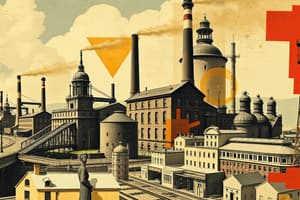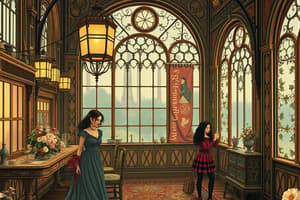Podcast
Questions and Answers
What significant cultural shift occurred during the Early Modern Period?
What significant cultural shift occurred during the Early Modern Period?
- Industrialization of economies
- Rise of totalitarian regimes
- Decolonization of nations
- Age of Exploration (correct)
Which event is directly associated with the consequences of World War I?
Which event is directly associated with the consequences of World War I?
- American Civil War
- Decolonization of Africa
- End of the Cold War
- Formation of the League of Nations (correct)
What was a primary cause of the American Civil War?
What was a primary cause of the American Civil War?
- National independence movements
- Debates over slavery and states' rights (correct)
- Industrial vs. agrarian economies
- Rise of European nationalism
What event marked the symbolic end of the Cold War?
What event marked the symbolic end of the Cold War?
Which term best describes the impact of European powers expanding their empires during Modern History?
Which term best describes the impact of European powers expanding their empires during Modern History?
Which major technological advancement is associated with the Industrial Revolution?
Which major technological advancement is associated with the Industrial Revolution?
Who was a notable figure advocating for non-violence in the Indian independence movement?
Who was a notable figure advocating for non-violence in the Indian independence movement?
Which of the following themes is associated with movements for civil rights during Modern History?
Which of the following themes is associated with movements for civil rights during Modern History?
Flashcards are hidden until you start studying
Study Notes
Modern History
Definition
- Period roughly from the late 15th century to the present.
- Marked by the rise of nation-states, industrialization, and global interconnectedness.
Major Divisions
-
Early Modern Period (c. 1500-1800)
- Renaissance: Cultural rebirth in Europe, emphasis on art, science, and humanism.
- Age of Exploration: European powers expand territories; discovery of the Americas.
- Reformation: Religious upheaval, leading to Protestantism and criticism of the Catholic Church.
-
Late Modern Period (c. 1800-present)
- Industrial Revolution: Shift from agrarian economies to industrialized ones; technological advancements.
- Political Revolutions: American Revolution (1776), French Revolution (1789), Latin American wars of independence.
- World Wars:
- WWI (1914-1918): Major global conflict; consequences include the Treaty of Versailles and map redrawing.
- WWII (1939-1945): Global war against Axis Powers; leads to the rise of the United States and Soviet Union as superpowers.
- Cold War (1947-1991): Tension between the USA and USSR; ideological conflict between capitalism and communism.
Key Themes
- Nationalism: Rise of national identity and statehood.
- Imperialism: Expansion of European empires, colonization, and the impact on indigenous populations.
- Social Change: Movements for civil rights, liberation, and feminism.
- Technology and Warfare: Innovations in warfare (e.g., nuclear weapons) and impact on global politics.
Significant Events
- American Civil War (1861-1865): Fight over slavery and states' rights; leads to the abolition of slavery.
- World War I and the Treaty of Versailles: Redefines national boundaries; creates tensions that lead to WWII.
- Decolonization (1945-1975): Former colonies gain independence from European powers.
- Fall of the Berlin Wall (1989): Symbolizes the end of the Cold War and the division of East and West Germany.
Notable Figures
- Mahatma Gandhi: Leader of the Indian independence movement; proponent of non-violence.
- Winston Churchill: British Prime Minister during WWII; known for his leadership and speeches.
- Nelson Mandela: Anti-apartheid revolutionary; first black president of South Africa.
Contemporary Issues
- Impact of globalization on modern societies.
- Continued effects of colonialism and post-colonialism.
- Global challenges: Climate change, terrorism, migration, and human rights.
Conclusion
Modern history shapes our understanding of current geopolitical dynamics and societal structures. It encompasses a range of movements, conflicts, and developments that continue to influence contemporary issues.
Modern History Definition
- Modern history spans from the late 15th century to the present.
- Defined by influential events such as the rise of nation-states, industrialization, and global interconnectedness.
Early Modern Period (c. 1500-1800)
- Renaissance: A cultural rebirth in Europe, emphasizing art, science, and humanism.
- Age of Exploration: European powers expanded their territories, discovering the Americas.
- Reformation: Religious upheaval leading to Protestantism.
Late Modern Period (c. 1800-present)
- Industrial Revolution: Transition from agrarian economies to industrialized ones, with technological advancements.
- Political Revolutions: Significant events include the American Revolution (1776), the French Revolution (1789), and Latin American wars of independence.
- World Wars:
- World War I (1914-1918): A major global conflict resulting in the Treaty of Versailles and significant map redrawing.
- World War II (1939-1945): A global war against Axis Powers, leading to the rise of the United States and Soviet Union as superpowers.
- Cold War (1947-1991): Tension between the USA and USSR, with an ideological conflict between capitalism and communism.
Key Themes
- Nationalism: The rise of national identity and statehood.
- Imperialism: European expansion, colonization, and its impact on indigenous populations.
- Social Change: Movements for civil rights, liberation, and feminism.
- Technology and Warfare: Innovations in warfare (e.g., nuclear weapons) and their impact on global politics.
Significant Events
- American Civil War (1861-1865): A conflict over slavery and states' rights, resulting in the abolition of slavery.
- World War I and the Treaty of Versailles: Redefining national boundaries, causing tensions leading to WWII.
- Decolonization (1945-1975): Former colonies gaining independence from European powers.
- Fall of the Berlin Wall (1989): Symbolizing the end of the Cold War and the division of East and West Germany.
Notable Figures
- Mahatma Gandhi: Leader of the Indian independence movement, advocating non-violence.
- Winston Churchill: British Prime Minister during WWII, known for leadership and speeches.
- Nelson Mandela: Anti-apartheid revolutionary, first black president of South Africa.
Contemporary Issues
- Impact of globalization on modern societies.
- Continued effects of colonialism and post-colonialism.
- Global challenges: Climate change, terrorism, migration, and human rights.
Conclusion
- Modern history provides insights into current geopolitical situations and societal structures.
- It encompasses various movements, conflicts, and developments that continue to influence contemporary issues.
Studying That Suits You
Use AI to generate personalized quizzes and flashcards to suit your learning preferences.




